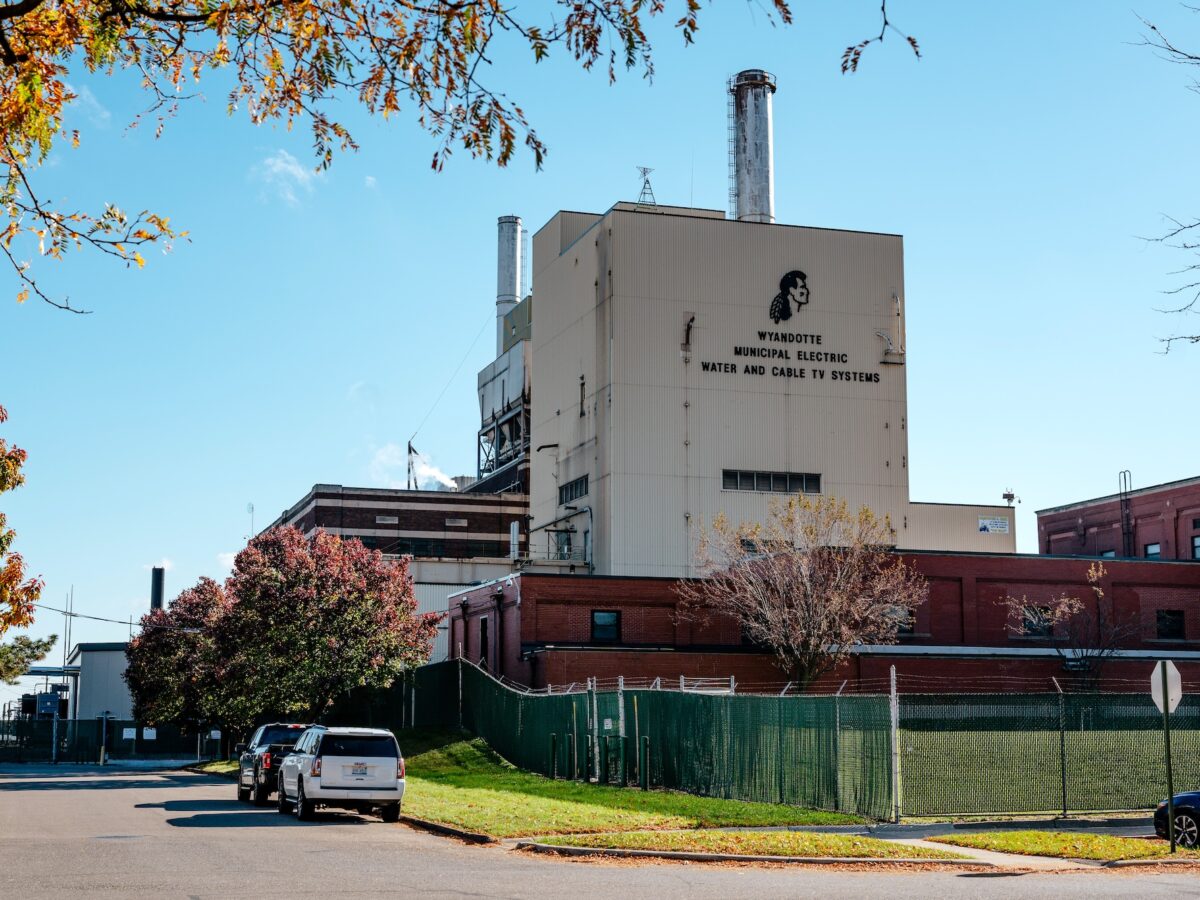Overview:
-Wyandotte responds to state environmental regulator's report that identifies "deficiencies" in its drinking water system.
-The city says it will craft a fluoride plan after dropping the additive from drinking water in 2015.
-"There is no explicit statement in any consumer confidence report stating they ended fluoride treatment with no intention of ever restarting," says drinking water expert Elin Betanzo.
Erin Craig wonders if the suspension of fluoride in Wyandotte’s drinking water affected her son Ethan’s health.
Craig recently learned that Wyandotte stopped fluoridating its drinking water in 2015, a change that was not widely publicized and was contradicted by information on a city website until earlier this month.
By the time Ethan was 4, he had seven baby teeth pulled and three capped, Craig told Planet Detroit, with spacers installed until his adult teeth came in. Ethan, now 8, never had soda or juice that could have contributed to tooth decay, she said.
The city acknowledges it could have done more to clearly communicate the 2015 decision to stop fluoridation, Wyandotte Mayor Robert DeSana said in a statement to Planet Detroit. Wyandotte’s drinking water “exceeds state and federal quality standards,” he said.
Craig said Wyandotte should restart fluoridation, and she said she wants the city to have a discussion with residents about the best path forward.
“I feel it was irresponsible to (stop fluoridation) without (residents’) consent,” she said.
Fluoride helps prevent tooth decay. Some research has found a link between excess fluoride and impaired brain development. The American Dental Association, American Association of Pediatrics, American Medical Association, and many other organizations support community water fluoridation.
Wyandotte to craft fluoride plan 10 years after removal
Residents told Planet Detroit that Wyandotte’s failure to clearly communicate its removal of fluoride casts doubt on the city’s transparency about other risks, such as contamination from the BASF site 1,700 feet from its water intake.
An April 30 drinking water system survey from the Michigan Department of Environment, Great Lakes, and Energy found “significant deficiencies” with Wyandotte Municipal Services’ treatment, distribution, and storage of drinking water as well as problems with the system’s oversight. The report did not connect these issues to the BASF pollution.
Wyandotte notified residents that it suspended water fluoridation in its annual water quality reports, according to the city’s May 29 response to the EGLE survey, which outlines plans to correct issues identified by the state regulator. Planet Detroit obtained the city’s response to the state via a Freedom of Information Act Request.
Wyandotte Municipal Services removed a mention of fluoride as a drinking water treatment on its website June 3 — a decade after fluoride was discontinued — following Planet Detroit’s reporting on the issue.
Elin Betanzo, founder and president of Detroit-based Safe Water Engineering LLC, told Planet Detroit it’s “misleading” for the city to suggest the suspension of fluoridation was communicated to residents.
“There is no explicit statement in any (consumer confidence report) stating that they ended fluoride treatment with no intention of ever restarting,” Betanzo said, adding that a customer would have to “really read between the lines” to understand that fluoridation had been stopped.
Wyandotte stopped adding fluoride to its drinking water in 2015. It acknowledged that it still needs to “develop or verify its fluoridation plan” in its May letter to EGLE.
“The water department is working with the Wyandotte Municipal Services Commission and the Wyandotte City Council on a fluoridation policy, and its communication. We will coordinate that with EGLE by October 31, 2025,” Wyandotte Municipal Services General Manager Paul LaManes said in a statement to Planet Detroit.
Detroit’s average fluoride level is 0.6 ppm, roughly equivalent to 0.6 milligrams per liter, according to the Detroit Water and Sewerage Department’s 2024 water quality report.
MORE REPORTING FROM PLANET DETROIT
Wyandotte cut fluoride from its water. Here’s what residents should know.
Drinking water that lacks fluoride requires more vigilance from parents and other residents to safeguard oral health, expert says.
Wyandotte water system problems pose ‘immediate health risk’: State regulator
State survey raises concerns about Wyandotte’s ability to protect water customers from BASF pollution and other contaminants, water expert says.
BASF Detroit River pollution: Environmental regulators discuss remedy for contaminated groundwater
Environmental advocates are calling for urgent action as regulators outline plans to curb pollution from BASF’s Wyandotte facility, which discharges 60 gallons of contaminated groundwater into the Detroit River every minute.
The national fluoride debate
Issues with Wyandotte’s water system come at a time of growing skepticism over water fluoridation.
Research shows water fluoridation can cut cavities by roughly 25%. Fluoride strengthens teeth and reduces cavities by replacing minerals lost during normal wear and tear, according to the CDC.
Fluoride can come from a number of sources, but drinking water is the main one for Americans, researchers say. Nearly two-thirds of the U.S. population receives fluoridated drinking water, according to CDC data.
U.S. Health Secretary Robert F. Kennedy Jr. said in April he planned to direct the CDC to stop recommending water fluoridation for communities. He’s previously called fluoride a “dangerous neurotoxin” and tied it to a range of health problems.
Ashley Malin, assistant professor in the Department of Epidemiology at the University of Florida’s College of Public Health and Health Professions, told Planet Detroit that fluoride can affect fetal and infant brain development.
“Since 2017 there have been studies that show that higher exposure to fluoride during prenatal development is linked with worse neurodevelopmental outcomes, even at levels that are typical for fluoridated communities in North America,” she said.
A report last year by the federal government’s National Toxicology Program, which summarized studies conducted in Canada, China, India, Iran, Pakistan and Mexico, concluded that drinking water with more than 1.5 milligrams of fluoride per liter, more than twice the CDC’s recommended level, is associated with lower IQs in children.
Margherita Fontana, a professor at the University of Michigan School of Dentistry, questioned the quality of the data included in the National Toxicology Program report. Many of these studies looked at water supplies that may have contained not only fluoride but also contaminants that could have impacted IQ and were not well accounted for in the research, Fontana said.
Better quality studies have been unable to find an association between fluoride and reduced cognitive function, she said.
“There’s really no good scientific data to illustrate that the concern over IQ is real,” Fontana said, adding that removing fluoride could be especially harmful given high-sugar modern diets.
“Before fluoridation … it was common for people to have dentures and to lose their teeth and have false teeth,” she said. “I think a lot of populations nowadays grow up with healthy teeth, and they expect to keep their teeth one way or another until they die.”
The University of Michigan School of Dentistry is exploring whether data is available to evaluate the impact of Wyandotte’s fluoride removal over the last decade, Fontana said.
‘They need to be prepared to communicate to the community’
Wyandotte gave itself until Oct. 31 to verify its fluoride policy and develop a communication plan, according to its letter to EGLE, a timeline that drinking water expert Betanzo said is concerning.
“Given the high-risk location of their intake downstream of the BASF plant, they need to be prepared to communicate to the community at any moment,” she said.
As much as 60 gallons per minute of groundwater contaminated with PFAS, arsenic, mercury, and other chemicals flows off BASF’s Wyandotte property into the Detroit River, according to a state estimate — upstream from Wyandotte’s drinking water intake.
EGLE officials have said the discharges violate a 1986 consent order. BASF disputes EGLE’s assertion regarding the consent order and said it is in compliance, the Detroit Free Press reported in May.
BASF spokesperson Marika Diamond told Planet Detroit that “we care deeply about our employees and local communities and operate our facilities in a safe and environmentally responsible manner,” and directed questions about drinking water to the city of Wyandotte.
Wyandotte Municipal Services acknowledged the vulnerability of its drinking water intake in the 2023 Water Quality Report, stating: “Our source was determined to be highly susceptible to potential contamination.”
Wyandotte Mayor DeSana has previously pushed back on concerns about the city’s drinking water.
“Wyandotte’s water system remains safe, well-monitored, well-managed,” DeSana said during an April 30 meeting to address the BASF contamination.
This comment was made the same day EGLE’s letter identified “deficiencies” in Wyandotte Municipal Services’ management and operations.
The failure to communicate with residents about the suspension of fluoridation makes Wyandotte resident Craig nervous about her drinking water’s potential exposure to pollution from BASF, she said.
“They seem to have slipped things in with the fluoride, and now they’re trying to convince us everything’s fine with BASF,” she said. “But what is really happening?”
The Associated Press contributed to this report.





